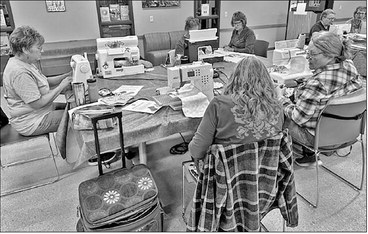$200K requested for homeless shelter


By Kevin O’Brien
Marathon County supervisors are being asked to approve at least $200,000 for a yearround homeless shelter in Wausau, but questions have been raised regarding how exactly the money will be spent and whether outlying communities should be contributing tax dollars to fix a problem that is mostly handled by the county seat.
At two different committee meetings last week, officials mentioned situations in which a homeless person is dropped off somewhere in Wausau because that is where a majority of the social services and mental health resources are located. Wausau Police Chief Matt Barnes told the Health and Human Services Committee that it’s not uncommon for someone with untreated mental illness to be left at a place like Kwik Trip, with the expectation that county and city government will provide services for the person.
“That is a regularly occurring situation, and sometimes it’s from other counties and sometimes it’s from neighboring communities,” he said.
Barnes said “treating a human like a hot potato” is burdensome for the city of Wausau and Marathon County, which takes on the brunt of the homeless problem with little or no help from other government entities.
Supervisor Ann Lemmer, who represents a portion of Wausau, said she’s heard from reliable sources that people from places like Antigo and other communities in Central Wisconsin end up in Wausau because North Central Health Care and other facilities are located there.
“You can’t just traffic humans like this and drop them off in the deep dark of the night, and then make it Wausau’s problem because we have these resources,” she said.
Lemmer wondered if the county could adopt an ordinance that prohibits outlying municipalities and other counties from essentially offloading unhoused people without some kind of financial contribution.
“You need to have a warm handoff and you need to pony up and pay some money to help us run this emergency shelter for your people too,” she said.
See HOMELESSNESS/ Page 6 Homelessness
Continued from page 1
A joint city-county task force was formed last fall to tackle the homelessness issue, and after five meetings, the county board agreed last week to extend the group’s charter until April 1 so its members can address the imminent need for a homeless shelter that is open 24/7, 365 days a year.
An urgent need
Chief Barnes told county supervisors last week that Catholic Charities in Wausau plans to cease operations of its nighttime Good Shepherd Shelter at the end of April (at least temporarily), leaving the homeless population with few options for a safe place to sleep.
“That’s of great concern to me,” he said. Faced with a lack of funding and staffing shortages, Catholic Charities already shut down its daytime shelter at the end of 2024. Its contract with the city expires at the end of April, and nothing else is in place to continue overnight shelter services, Barnes said.
In December, the Wausau City Council voted to allocate a total of $400,000 in funds from the American Rescue Plan Act toward sheltering homeless people. The task force is asking the county to match or exceed the $200,000 set aside for this year and possibly contribute another $200,000 in 2026.
Members of the H& HS Committee voted Feb. 11 to recommend that the county match the city’s $200,000 annual contribution for two years, but they left it up to Human Resources, Finance and Capital to decide where the money would come from. At its meeting the following day, the HRFC responded by delaying its decision for a week to give the task force a chance to address supervisors’ concerns at its next meeting on Feb. 19.
County administrator Lance Leonhard said the goal is to have the city and county work together on a request for proposal (RFP) that would be sent to organizations interested in operating a round-the-clock homeless shelter. Leonhard identified three potential sources for the monetary match – contingency funds, reserves and sales tax revenue.
Supervisor Bill Conway, a member of the task force, said the reason for the requested contribution is twofold. First, it mirrors a city-county partnership started in La Crosse County, and second, it takes into account a lot of the services the county is already responsible for, such as substance abuse treatment, mental health services and veterans services.
“So, it makes sense for us to bear some of that burden,” he said.
The goal is to secure a facility that can house between 40 and 60 people at a time, Leonhard said.
“There are different organizations that are interested in taking that over, so providing the funding I think is the necessary first step,” Conway said.
Supervisor Lemmer, however, said she would like to know more about how the county’s contribution would be spent and would also like some strings attached so that whoever takes over for Catholic Charities does a better job of keeping it open. She also worried about the long term impact on existing county services, and whether more staff would need to be hired to help those without housing become self-sufficient.
Leonhard agreed that “there needs to be clear performance expectations” for whatever group takes over the shelter, and once the county receives responses to the RFP, those proposals would be evaluated and scored just like with any other RFP process.
Board chairman Kurt Gibbs echoed Lemmer’s concerns about sending out an RFP without fully knowing what the county’s responsibilities will be once it agrees to invest in providing emergency shelter services.
“I’m just concerned that we are putting the cart before the horse,” he said.
Conway said the task force would address the county’s concerns and come up with answers at its Feb. 19 meeting “That makes perfect sense,” he told other supervisors. “You wouldn’t want to write a blank check without knowing what you’re getting for your money.”
Committee chairman John Robinson said the HRFC will meet again on Feb. 20, before that night’s county board meeting, to go over what the task force came up with and make a recommendation to the board. Robinson said he’s worried that waiting another month would not allow enough time for the city and county to find a new shelter provider before the Catholic Charities shelter closes at the end of April.
As a taxpayer in the city of Wausau, Lemmer said she strongly believes the rest of the county needs to help shoulder the burden, and doing nothing at all “is not an option.”
“It is important to understand that this is an emergency, and it is growing,” she said.
Skepticism at the board
A resolution in the board’s Feb. 20 packet calls for spending $200,000, but it does not yet specify a funding source. Regardless of where the money comes from, a two-thirds majority vote is needed for the county board to amend this year’s budget.
Supervisor Ron Covelli, vice-chair of the homelessness task force, said data from the Wausau Police Department suggests that an estimated 200 homeless people are living in the Wausau area, but many of them may be “couch surfing” or sleeping in their vehicles.
After hearing a presentation about La Crosse County’s “Pathways Home” initiative, he said the task force is interested in developing a similar city-county partnership in Marathon County.
Covelli said La Crosse had a tent city with homeless people living in it at one point but after about a year of working with the county, they are getting closer to a goal of “functional zero,” where the number of people finding homes is the same or greater than those entering homelessness.
At last Thursday’s educational board meeting, however, several supervisors expressed skepticism about the county taking on a responsibility for providing shelter.
Supervisor Scott Poole said “it looks like the knee-jerk reaction is to go with public funding,” and wondered if anyone had reached out to the business community or non-profits. Poole also said a lot of other programs he’s seen are “too housing focused,” and don’t include any requirements for homeless people to improve their situations.
“That should be the north star of this program, getting people self-sufficient,” he said.
Covelli said the task force has talked about that issue, but he said the county is limited in what it can do when trying to get someone to accept help for mental illness or drug and alcohol addiction.
“We can’t force somebody – unless they’re breaking the law or are a danger to themselves or other people – to take those services,” he said. “It’s just not an option. We can’t infringe upon their constitutional rights.”
Supervisor Deb Hoppa, who worked for years as a case worker for Catholic Charities, said this issue is “near and dear to my heart,” and she’s astounded by why it’s taking so long to come up with a solution when people may be freezing out on the streets. A homeless shelter she was involved in was “opened, furnished and running” within a couple months, she said.
“I don’t know what the answer is,” she said. “I just know it shouldn’t be so hard to help these people.”
Hoppa cast the lone no against extending the task force until April 1.
Supervisor Brandon Jensen said he was very much in support of extending the task force’s time frame, but he has reservations about allocating more tax dollars after just adopting a 2025 budget that took $1.6 million out of reserves to prevent a tax increase.
“If we are going to have a good solution, it needs to be well thought out,” he said. “Before we put any taxpayer money toward this, it needs to be a well thought-out process so we’re devoting funds to the right place.”
Kurt Gibbs




